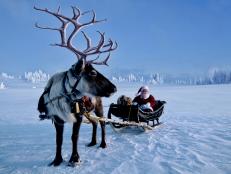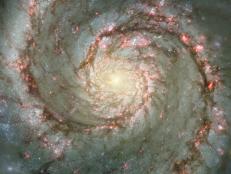SPACE OUT with Paul M. Sutter
All SPACE OUT Articles
Showing 46 - 60 of 153 results
The James Webb Space Telescope Launches!
Finally! It was initially proposed way back in 1998 and named the James Webb Space Telescope in 2002. After a decade of delays and over 10 billion dollars past its original budget, NASA’s next great observatory finally launched from the European Space Agency’s Guiana Space Centre in South America.
Time Dilation, Special Relativity, and Santa’s Delivery Schedule
How does Santa make it to all the children in the world in one night? Can flying reindeer travel at the speed of light?Dive into the physics behind this Christmas tale.
The Sheer Awesomeness and Weirdness of Cosmic Strings
I’m going to start this off by telling you that we’re not sure if cosmic strings exist.But if they did, it would be awesome.
The Secrets of Jupiter’s Atmosphere…in 3D!
Jupiter is all sorts of wild.
All Aboard the James Webb Space Telescope!
All hail the James Webb, the ultra-powerful super-telescope for the next generation. Or for about 5-10 years when its fuel runs out.
The Ultimate Origins of Your Thanksgiving Dinner
We’ve all heard the story of the first Thanksgiving, but this meal – and life itself, if we’re being honest – wouldn’t be possible without the elements themselves. And those elements took a long journey to end up on your dinner plate.
The First Exoplanet Found…Outside the Galaxy!
This new planet has had a pretty rough life.
Meet WASP-127b, the Fluffiest Planet in the Galaxy
Take a planet with the mass of, say, Saturn. You know, pretty big, but not ridiculously big. Just…normal big.
What is “Dark Flow”?
It sounds super-scary: something from outside the universe, a force so unimaginable, is pulling every single galaxy towards it. What monstrosity of cosmic physics could it be?
Check Out NASA’s DART Mission
It’s like “Armageddon” but in real life.
There’s a Hole in Our Galaxy
Folks, we just found a 500-lightyear-wide hole in our galaxy. Fess up: which one of you did it?
Watch Out! Meteorite Crashes Into a Woman's Bed
Insert “Did you feel the Earth move?” joke here.What weighs 2.3 pounds, is made of rocks, and plummets into your bed from outer space? Oh, it’s not a riddle; it’s just a meteorite.
The Eeriest Place in the Universe
Imagine being completely, utterly alone. Surrounded by no planets, no stars, no galaxies. Not a single scrap of matter – not even a hydrogen atom – within hundreds of millions of lightyears. Welcome to the loneliest place in the cosmos: the great cosmic voids.
Why Pluto Isn’t a Planet, but (Maybe) Should Be
What, exactly, is a “planet”? For ancient astronomers it was pretty easy. When they stared up at the night sky, they saw a) the sun, b) the moon, c) a lot of fixed stars, d) a few wandering points of light. Those vagabonds were the planets. Indeed, our word planet comes from the Greek word for “wanderer”.
The Milky Way Broke its Arm (But is Totally Okay)
The Milky Way is a giant, magnificent, truly transcendently beautiful spiral arm galaxy. It’s too bad we can’t get a decent picture of it. The problem is that we live inside it, and so astronomers have to work extra-hard to construct an accurate map.


























